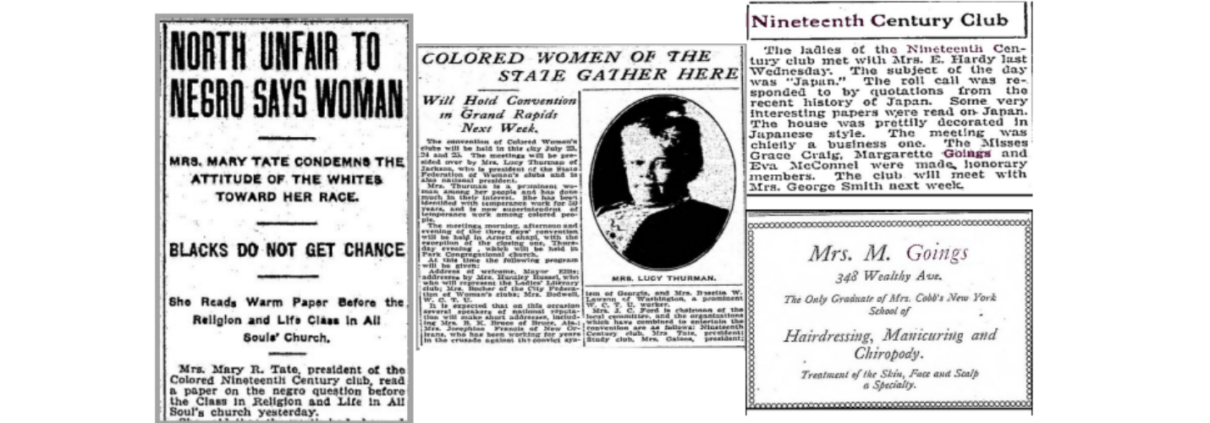The Married Ladies Nineteenth Century Club
By Sophia Ward Brewer, 2018
Bold, brave, brilliant, and yes, bourgeois are all words that I would use to describe the Married Ladies Nineteenth Century Club, later called the Nineteenth Century Club. Formed in 1894, just 29 years after the Civil War, this group of African American women decided to organize, educate themselves, and exercise their social and political power here in Grand Rapids. Their mere name suggests some of their struggles to overcome the negative stereotypes that plagued black women in the nineteenth century. The Married Ladies Nineteenth Century Club and other clubs like them were instrumental in provoking social and cultural change regarding race at the turn of the twentieth century.
The Married Ladies… were bold and brave
The club was formed some 15 years prior to the formation of the National Association for the Advancement of Colored People, the NAACP, and two years before the formation of the National Association of Colored Women’s Clubs. With African Americans in Michigan being less than one percent of the population at this time, this was not only bold, but brave. The Civil War had only ended 29 years prior and some of the women in the group had migrated north since the end of the Civil War. Though Michigan wasn’t a slave state, there was much resistance to black mobility, black migration, and black progress in this state.
Their boldness was indicated in the fact that there were other Nineteenth Century Clubs all across America. However this club felt it important that they describe themselves as “married ladies.” Perhaps this was to combat the negative depictions of black women during this time as un-wed, over-sexualized, and dehumanized. The articles they submitted to the Grand Rapids Herald defied this image by showcasing their talents, cultural and literary activities, as well as their homes and ability to entertain. They wanted the world to know that, despite the challenges they faced, they had social status and were living comfortably.
The Married Ladies… were brilliant
In articles published in the Grand Rapids Herald, the women reported on what they did during their regular meetings. It was evident early that they were more than a social club. One of the missions of the club was the bettering or the uplifting of the race. They did this by reading, sharing information, promoting literacy, and writing, among other things.
As early as 1898, the members wrote articles denouncing negative and false stories about black people published in newspapers. Later, in 1907 Mary Roberts Tate, a member of the club, wrote an article about the treatment of blacks in the North titled “North Unfair to the Negro.”
Like many social clubs during this time, the Married Ladies Club was also a literary society. During their regular meetings they read essays, poetry and shared information about current events. Their brilliance was evident in an article published in 1905, in which they boasted of a Japanese-themed meeting in which they answered the roll call with a quotation from the history of Japan.
The Nineteenth Century Club, along with the Grand Rapids Study Club, hosted a statewide conference for colored women’s clubs in Grand Rapids in 1907. Emma Ford, a member of the Nineteenth Century Club, was the chair of the committee who organized the conference. The conference was presided over by Mrs. Lucy Thurman of Jackson, who was the president of the state association and the national federation. The conference was held in Arnett Chapel, but the closing ceremony was held in the Park Congregational Church.
Among the speakers at the conference were both local and national personalities. George Ellis, the mayor of Grand Rapids spoke, as did Clara Comstock Russell from the Ladies Literary Club. National speakers included Josephine Bruce of Alabama, Josephine Francis of New Orleans, and Rosetta Lawson of Washington.
The Married Ladies… were bourgeois
Many of the ladies in the club were accomplished in their own rights. They owned businesses; for example, Minnie Goings, who was a member of the club, operated a boarding house and beauty shop. Emma Ford, who was also a member, was married to Joseph Ford, who was affectionately known as “Senator Joe” because he was the cloakroom attendant for the Michigan State Senate and active in the Michigan Republican Party. Minnie Goggins, another member, founded and operated the Richard Allen Home for Girls in the early twentieth century. In articles published in the Herald the members of the club boasted about their achievements, talents, and fine homes. Much of their writing suggests an air of sophistication, culture and class.
Sources
This article can also be found in the Summer 2018 GGRWHC Newsletter.

